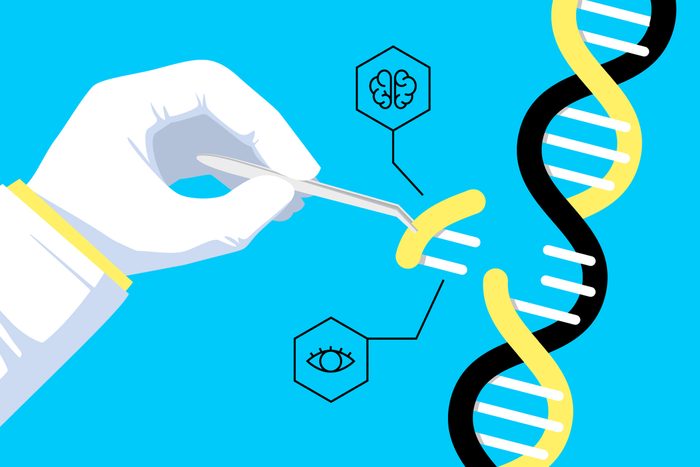
Weirdness in your genes
You can thank your parents for your eye and hair color, the shape of your nose, and maybe some of the health issues you might have. But there are all sorts of other interesting things that came wrapped up in your DNA. Who knew that whether the sun makes you sneeze or if you hate exercising can be traced back to your genes? Take a look at the weird traits you can chalk up to genetics.
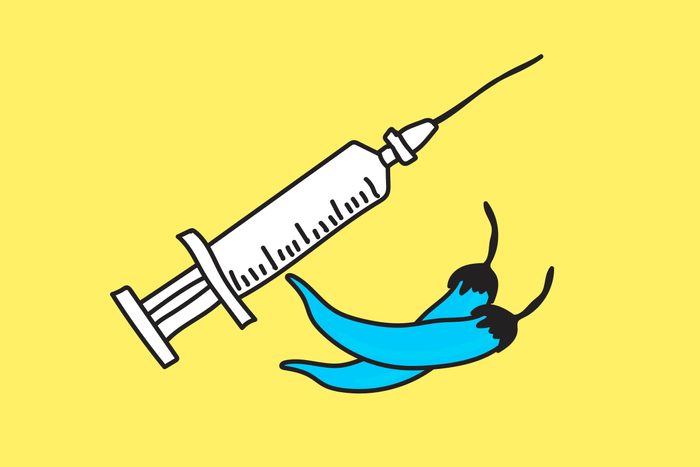
Your tolerance for pain
If you’re a redhead, you didn’t just get your ginger locks from your parents—you also got this inherited trait: an ability to withstand stinging pain better than blondes and brunettes. In a series of studies, Danish researchers at Aalborg University injected subjects with capsaicin, the active component of chili, and found that redheads were less sensitive to this type of pain. Because of this, they can better tolerate spicy foods as well as the discomfort of a pinprick. Other research, however, suggests that the world’s 2 percent of redheads are more sensitive to cold and less responsive to injected forms of anesthesia. No matter the color, here are 30 tips for healthier, more attractive hair.
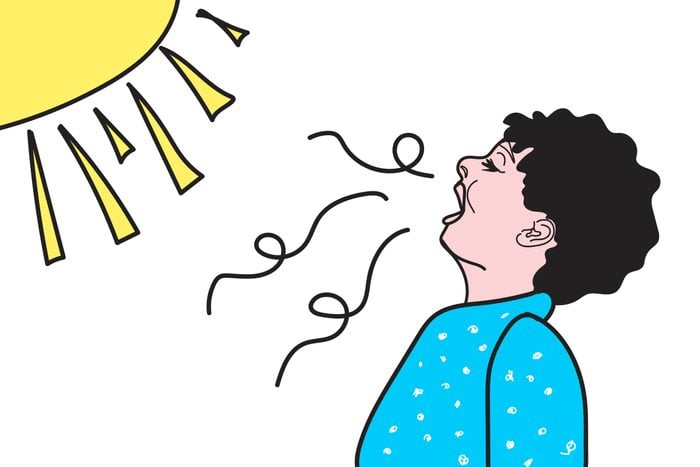
A bizarre habit of sneezing at the sun
The award for the quirkiest inherited trait goes to the cleverly named ACHOO Syndrome (Autosomal Dominant Compelling Heliopathic Outburst). According to the National Center for Biotechnology Information, people who are affected sneeze when they suddenly see bright lights. So, if you’re in a dark movie theater and then go outside or into a well-lit lobby, gesundheit! ACHOO Syndrome is dominant, so if one of your parents has it, you have a 50 percent chance of having it, too. (Learn if birth order can predict your health.)

Distinctive facial expressions
You know that “serious look” that you share with your mom? You might think that it’s the result of spending a lot of time together and subconsciously mimicking her expression since you were a child. You’d be wrong about that. Surprisingly, a study of blind subjects and their sighted relatives published in PNAS revealed that they shared significantly similar facial expressions. This even held true for relatives who were separated at birth and hadn’t met until years later. (These science-approved facial exercise may make you look years younger.)
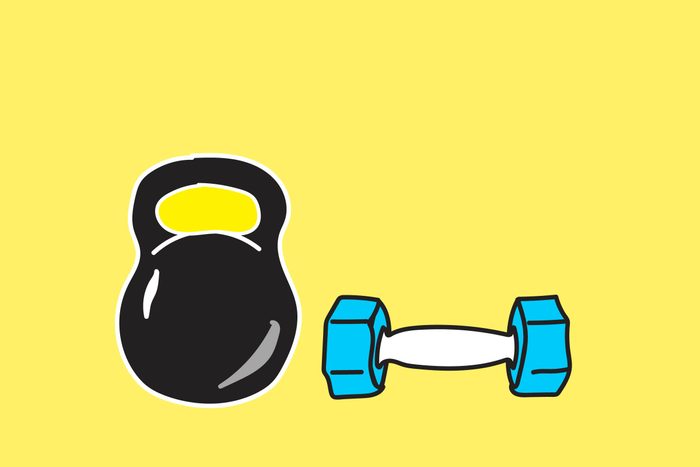
A love of—or hatred for—the gym
You know that great feeling you get when you finish a workout? No? It may be in your genes. Researchers have been trying to pinpoint the specific genetics that influence interest in physical activity. Researchers at the University of Georgia have offered preliminary findings suggesting people may have a gene that interferes with the release of dopamine, the feel-good neurotransmitter that regulates your brain’s pleasure and reward centers. This gene plus an individual’s personality affects a person’s natural urge to be active or, well, not.
But this doesn’t give you an excuse to skip the gym. Even if you don’t have the inherited traits that predispose you to like working out, you can still develop a love of exercise, even with a genetic inclination to be a couch potato. Dishman suggests two ways to start exercise habits: Find an activity you enjoy and find others who’ll do it with you to offer encouragement. (Need motivation? Here are 6 ways exercise makes your brain better.)
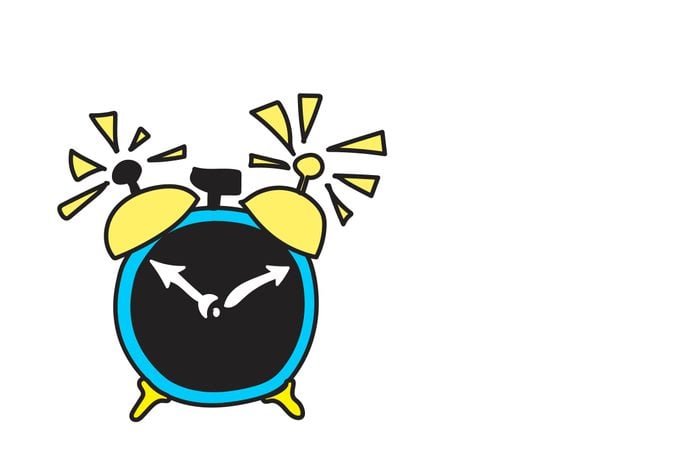
Whether you wake up early or burn the midnight oil
“Early to bed, early to rise” sounds like common sense, but not if your genes are working against you. A 2019 study in Nature Communications found that people may be genetically predisposed to be morning larks or night owls. Researchers used data from nearly 700,000 people who had shared their information with genetic companies. They found more than 351 spots on the genome that influence our waking and sleeping habits.
That internal clock of yours? It might be programmed with a snooze button, so don’t let anyone else tell you and your inherited traits when to get out of bed in the morning. (Here are 22 ways you’re probably sleeping wrong.)

Your java obsession
This inheritance could cost you a bunch of money over the course of your lifetime. Believe it or not, a love of coffee—or more accurately, the way that your body metabolizes caffeine—can be passed down the genetic pipeline. In a study published in the journal Scientific Reports, researchers compared coffee drinkers in Italy and the Netherlands and found that those with a greater expression of the PDSS2 gene reported drinking less coffee. They theorize that those people metabolize caffeine slower and therefore need less of it to feel happy and awake. As for the others? They’ll likely want a really big mug. (Here are 11 ways to make your coffee habit healthier.)
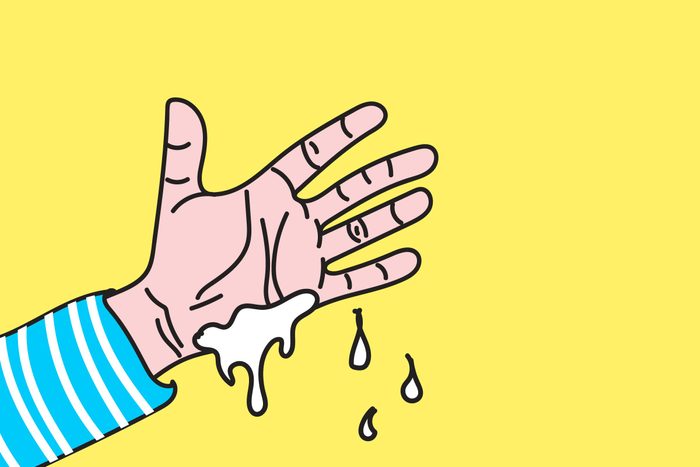
Sweaty hands
It might not just be your nerves. If it’s chronic and excessive, it’s likely your DNA—and the way your sympathetic nerve, which controls your body’s flight or flight response, contracts blood vessels in your hands (and possibly also your feet). UCLA researchers found that two-thirds of patients who suffer from hyperhidrosis, aka “sweaty palms syndrome,” have a family history of it. However, a person only has a 28 percent chance of inheriting this trait if one of their parents has the disorder, indicating that other genes may also need to be present. How prevalent is this syndrome? Around 5 percent of people may have some form of it. (Here’s why some people sweat more than others.)
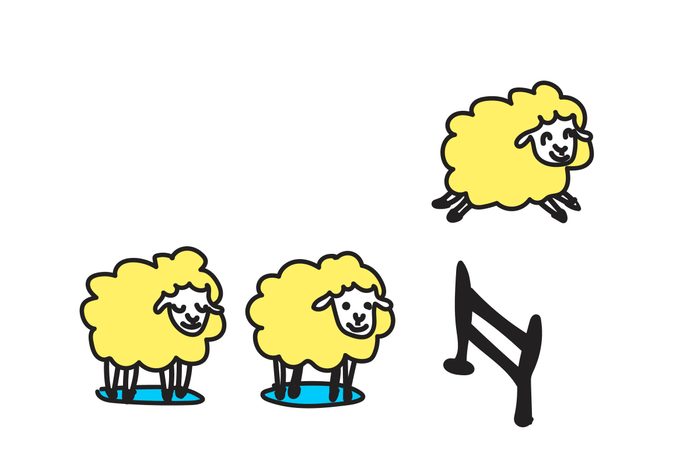
Insomnia
Your restless nights might not just be a symptom of your stressful days. Insomnia often runs in families, and in fact, an international team of researchers recently identified seven genes that put people at risk for insomnia. In the study, published in Nature Genetics, they also found a strong genetic overlap with anxiety disorders, depression, and neuroticism. So, perhaps this will make you sleep better tonight. It’s not all in your head, and someday, there may be more biologically based ways to help you get some shut-eye. (In the meantime, here are 11 natural remedies for insomnia that actually work.)
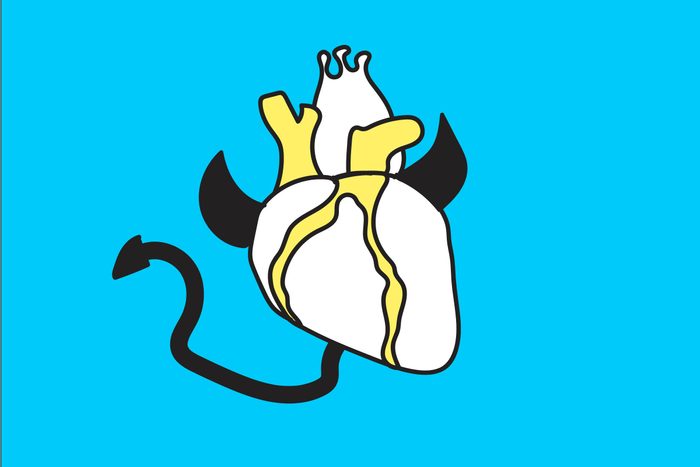
Your cheating heart
You’ve probably heard the theory that men cheat because they have a biological imperative to “spread their seed.” Early research with zebra finches published in PNAS actually found that some males have a “playboy gene” (which is actually a variant on the thrill-seeking DRD4 gene). What may be news to you is that female genetics can be just the same. The reason? A mutation on the vasopressin receptor gene may affect trust, empathy, and bonding.
The presence of these genes in either sex doesn’t control behavior—people make choices—but the inherited traits in men and women for this impulse aren’t as uncommon as you might think. (Check out these myths about sex you still believe.)

Whether you have the urge to ski a black diamond
Sure, skill determines your ability to make it down a tough trail in one piece, but your genes influence whether you even want to be there in the first place. In a study of 500 intermediate to expert skiers and snowboarders published in the Scandinavian Journal of Medicine & Science in Sports, researchers found that those who had a specific genetic marker were more likely to take risks on the slopes than those without it.
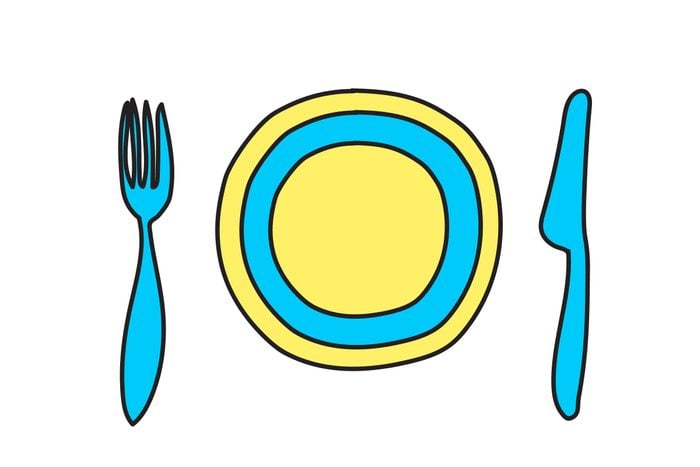
Whether a diet works for you
The likelihood that a diet will work might have more to do with your genetic makeup than the diet itself, according to a study on mice published in Genetics. The real-world (and human) takeaway? “Health effects of the diets were highly dependent on genetic background, demonstrating that individualized diet strategies improve health outcomes in mice,” the researchers wrote. “If similar genetic-dependent diet responses exist in humans, then a personalized, or ‘precision dietetics,’ approach to dietary recommendations may yield better health outcomes than the traditional one-size-fits-all approach.”
The bottom line? One diet doesn’t work for everyone, and in fact, many experts say dieting doesn’t work at all and recommend intuitive eating instead.

How aggressive you were as a toddler
If your terrible twos were a little more intense than normal, it may have been your parents’ fault—but not because of their iffy parenting skills. According to research published in Psychological Medicine, frustratingly aggressive behaviors like hitting, biting, and kicking in early childhood have more to do with genetics than environmental factors. Luckily, this behavior won’t necessarily continue, as long as it’s dealt with mindfully and carefully. In fact, a study in PLOS One found that while early aggression may be an inherited trait, after the age of 6, it’s more about environmental factors and a parent’s, well, parenting.

How trusting you are
Do you believe your friend’s excuse for bailing on plans tonight? Genetics might be partially responsible for your answer to that question. In a study of twins published in PNAS, researchers at the University of Arizona found that trust is 30 percent heritable. What if you’re more suspicious? Well, that’s because of your prior (and probably negative) experiences. Distrust, according to the study, is not an inherited trait and “appears to be primarily socialized.”
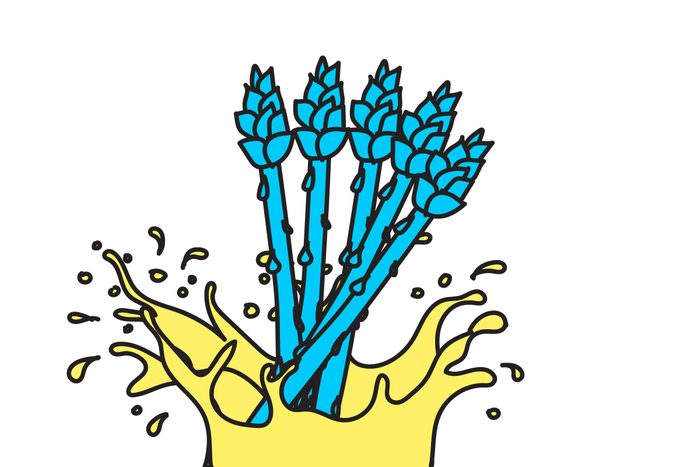
Your ability to smell “asparagus pee”
Let’s talk about pee for a second. You may have heard—or know all too well—that asparagus can cause some people’s pee to smell funny. What you may not know is that it may make everyone’s pee smell funny because our bodies turn asparagusic acid into chemicals that contain sulfur. So why can’t some people smell it? It could be due to a single genetic mutation on a cluster of genes that affect olfactory receptors, meaning that the inherited traits that affect your sense of smell could be the true culprits here. (Check out these 8 smells that actually can make you happier.)

Your sweet tooth
Yes, that cookie tastes really good—but it may taste even better to you or your child. A study published in Nutrients from researchers at the University of Guelph found that nearly 80 percent of preschoolers carried at least one of the genotypes that makes them want to snack on sweets instead of veggies. Similarly, a prior study published in Chemosensory Perception examined a variation on the TAS2R38 taste-receptor gene, which causes vegetables like Brussels sprouts and kale to taste more bitter to certain people. How did that affect their diets? Those who didn’t experience the bitter taste ate 200 more servings of vegetables per year. (Find out 14 vegetables you really should stop avoiding.)
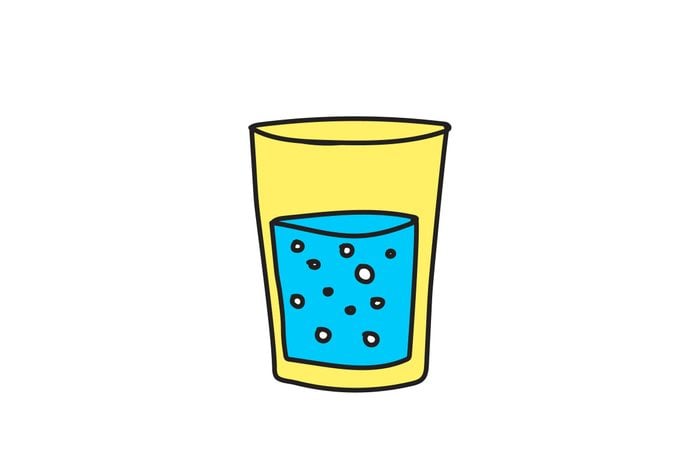
Whether you see a glass as half empty or half full
If you never quite look on the bright side, it’s not necessarily because life has beaten you down. Your OXTR gene, which affects the receptor for the love and bonding hormone oxytocin, could be responsible. According to a study published in PNAS, people with a certain variation on that gene “were less optimistic, had lower self-esteem, and felt less personal mastery” than people with a different variation. That said, while this inherited optimism or pessimism may influence your outlook on life, it’s not the only determining factor. Here are 10 things that naturally optimistic people do every day—which can alter your perspective, no matter what’s in your genes.